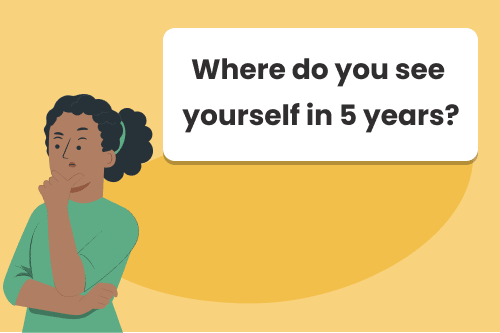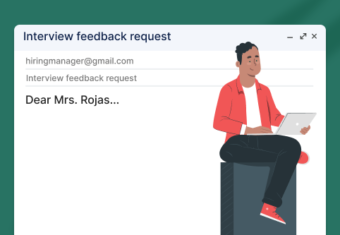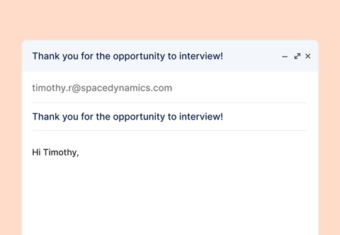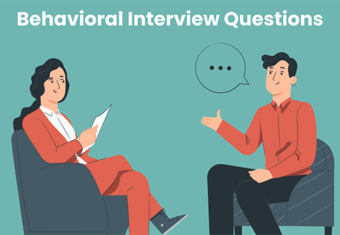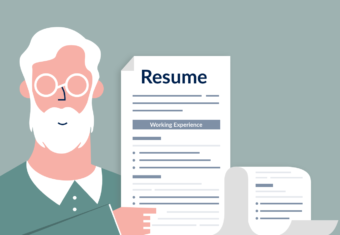Whether you’re a seasoned professional with decades of experience or this is your first job hunt, you’ve almost certainly been asked the question “where do you see yourself in 5 years” in an interview.
It’s one of the most common interview questions employers ask when evaluating candidates. But how should you answer it? What information are interviewers looking for?
Keep reading to learn how to give an answer that conveys you’re the right person for the job.
Why do hiring managers ask “where do you see yourself in 5 years?”
Hiring managers ask “where do you see yourself in 5 years” because it gives them insight into what motivates you, your future plans, and what role their company plays in those plans.
Here’s what employers are looking for in your answer:
- If you plan on staying with the company long-term
- If you’re ambitious
- If you’re passionate about the job or plan on quitting as soon as you find a job in your preferred field
- If you have a realistic idea of what it’ll take to reach your career goals
Keeping this in mind will help you craft a thoughtful response and prevent you from being caught off guard.
How to answer the “where do you see yourself in 5 years?” interview question
Even if you know what information employers are trying to gather when they ask where you see yourself in 5 years, coming up with a good answer can be tricky. Especially if this is your first job interview or you don’t prepare properly for the interview in advance.
To help you provide a well-thought out answer, here are some do’s and don’ts for answering “where do you see yourself in 5 years?”:
Do:
Be honest
If the only reason you want the job is because you didn’t get any other offers, it’s best to keep that information to yourself. What you can do, however, is focus on the skills you’d like to develop in the next few years and how this position will help you achieve that goal.
Stay realistic
While ambition is important, so is setting achievable goals. It shows employers that you have a clear idea of what you’ll need to do to advance your career, and within the company. For example, if a particular certification is required to advance in your field, mention that you plan on taking a course to get certified.
Align your answer with the company’s goals
For example, if the company is planning on expanding into new markets, explain that you’d like to take on a leading role in implementing those plans. This demonstrates initiative and that you understand the company’s vision.
Similar to answering “why should we hire you“, you want to show what value you offer the company. By demonstrating how your goals align with the company’s, you indicate that you will be a motivated employee with a long-term vision.
Don’t:
Exaggerate
If you’re applying for an entry level position, don’t say that you see yourself running the company in a few years. It makes you come across as unaware of the amount of hard work it takes to move up within a company (and look like you’re trying to steal your boss’ job).
Admit you have no plan
Few have all their career moves planned out in detail, and you never know for sure what the future holds. However, don’t tell the interviewer that you have no idea where you’ll be in 5 years.
Say you’ll leave the company
Employers understand that you probably won’t stay with the company for the rest of your career, but you don’t want them to think that you’ll write your resignation letter as soon as you receive a more attractive offer. Instead, emphasize your interest in the position and explain how it fits into your overall career plan.
Focus on goals unrelated to your career
Becoming a master air guitar player is an admirable undertaking, but it’s unlikely to impress employers. Stick to goals that relate directly to your career to improve your chances of getting a callback.
Best answer examples to “where do you see yourself in 5 years?”
Here are some industry-specific “where do you see yourself in 5 years” sample answers to show you how to answer – and how not to answer – this popular interview question:
Accounting
Good example
I’m always looking for new challenges, so during the coming 5 years I would like to acquire my CPA license. This will allow me to take on more diverse tasks that require extensive knowledge of accounting principles and a highly specialized skill set.
Bad example
In 5 years I see myself becoming better at my job.
Administrative assistant
Good example
I really enjoy problem solving and dealing with logistical matters so I’d like that to be a bigger part of my job. In 5 years, I expect to have acquired the experience necessary to become an effective executive assistant.
Bad example
I don’t really have a plan for the next five years, but I don’t want to still be stuck in an administrative assistant role.
Customer service
Good example
I love working with people, so customer service is a great fit for me. My goal for the next five years is to improve my leadership skills and transition into a managerial role that allows me to use my problem solving skills to develop better strategies for improving customers’ experience.
Bad example
In 5 years I’d like to become a manager because I want to make more money.
Other interview resources
Once you’ve prepared the perfect response to “where do you see yourself in 5 years?” be sure to round out your interview prep using some of the resources below:
- How to answer “tell me something that’s not on your resume”
- Answering “why are you leaving your current job?”
- How to answer “what is your greatest strength?”
- Top interview tips
- Sample answers for “tell me about a time you had a conflict at work?”
- How to answer “what do you like least about your job?”
- “Why do you want to work here?” guide and example answers
- How to approach “why did you leave your last job?”
- Sample answers to “What makes you unique?”
Click to rate this article
4.3 Average rating


